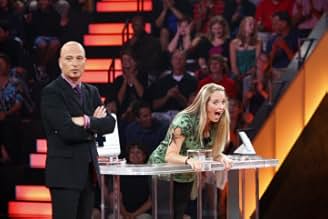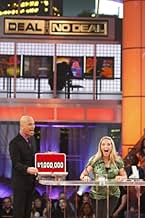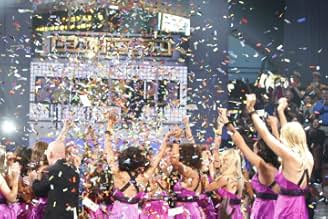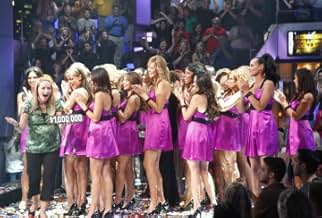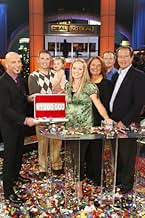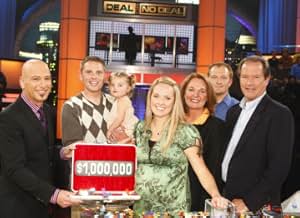AVALIAÇÃO DA IMDb
5,1/10
4,4 mil
SUA AVALIAÇÃO
Adicionar um enredo no seu idiomaContestants face 26 sums of money, 26 suitcases, and one question: Deal or no deal?Contestants face 26 sums of money, 26 suitcases, and one question: Deal or no deal?Contestants face 26 sums of money, 26 suitcases, and one question: Deal or no deal?
- Indicado para 1 Primetime Emmy
- 2 vitórias e 9 indicações no total
Explorar episódios
Avaliações em destaque
This is, without doubt, the most boring show I've ever seen.
I admit, I've only watched it once, but once was enough to convince me there is a major void in talented game show producers.
The only way I'd watch again is if it was on late/late night and I was having trouble sleeping.
It might be less boring than counting sheep (I suppose).
And that Howie person? Oh please.
zzzzz
(and seriously, all those models...where did they get those things, Stepford Modeling Agency?)
I admit, I've only watched it once, but once was enough to convince me there is a major void in talented game show producers.
The only way I'd watch again is if it was on late/late night and I was having trouble sleeping.
It might be less boring than counting sheep (I suppose).
And that Howie person? Oh please.
zzzzz
(and seriously, all those models...where did they get those things, Stepford Modeling Agency?)
All that happens in this entire show is models holding numbered briefcases walk out, then the host (that famous and hilarious guy who starred in the movie "Walk Like A Man" in like 1981 then disappeared until now) asks the contestant to randomly pick numbers. Then they open those cases. Wow! That's it. The object is to not open the cases with big dollar amounts in them. A completely random game. After each round, the "banker" (a shadowy figure in a booth overlooking the studio floor - possibly one of the host's "Walk Like A Man" co-stars) calls down with an offer to buy the briefcase the contestant selected. Then they have to decide if they will take the offer or shout "NO DEAL!" and put the smack down on a big red button, which is so dramatic a moment I simply cannot put it into words. This show is almost as boring as watching grass grow. It says nothing but horrible things about our society that this random-numbers-guessing-game is a highly rated TV show.
"Deal or No Deal", from Endemol, the folks that gave you "Fear Factor" and "Extreme Makeover", brought this international import to the States for a five-night run on NBC originally back in December 2005. Hosted by Howie Mandel, the show is like a cross between "Let's Make a Deal" and "Russian Roulette", and here's how it works: A contestant out of the audience chooses one numbered briefcase out of 26 for their game. The cases have cash values ranging from one cent all the way up to $1 million (and there are several six-figure prizes starting at $100,000). All the values are posted on a large, projection-screen TV monitor in the studio. The contestant then begins a process of elimination, calling out the numbers of six briefcases. As each number is called, a lovely model opens the numbered case to reveal the cash amount inside (Mandel: "Nikki, open the case."). The cash amount is then removed from the list of cash values on the projection monitor.
Following this, a "banker", seated in a surveillance room above the studio floor, phones the host with an "offer" - a dollar amount he is willing to make for the briefcase the contestant chose at the start of the game. Essentially, the offer is an average of all the cash amounts on the monitor that haven't been yet eliminated - the more low amounts that are eliminated, the higher the offer. The host informs the contestant of the offer - which is posted in large numerals on the projection monitor - and then, after a bit of mathematical banter, the host pops the all-important question to the contestant: "Deal or No Deal?" If the contestant accepts the Deal, he/she wins the value of the offer and the game ends. If not, the contest must open five more briefcases before the next offer is made. If the contestant passes on the Deal at that point, then he/she must open four more cases, then three more, then two more, until in the later points in the game, there is an offer issued after one briefcase is selected.
The tension increases with every round of selections because in many cases, a contestant chooses a case with a large dollar amount, eliminating the possibility of winning that prize. Also adding to the drama - the contestant has three to four other guests (loved ones or friends) on the show to help him/her decide whether or not to take a Deal, usually introduced after the second round of briefcase selections. So there is an emotional aspect to "Deal" as well, one the large studio audience gets pumped up for.
Once the contestant has accepted a Deal, the host has the contestant theoretically play out the rest of the briefcase selections ("Let's see what you would have done...") and then reveals the contents of the briefcase that the contestant chose at the start of the game.
Overall, "Deal or No Deal" offers the best odds for winning $1 million on national TV - 1 in 26. But as host Howie Mandel states at the beginning of each show, the game is a combination of "luck, guts, and a great sense of timing." Part of Mandel's opening spiel: "One million dollars as the top prize. No crazy stunts to perform, no trivia questions to answer. In fact, there's only one question you need to know how to answer, the only question that counts. Deal or No Deal?" At the time of this writing, "Deal or No Deal" was introduced by NBC as a "stripped" broadcast (same time for five consecutive weeknights), airing between 8pm and 9pm Eastern Time. The show's initial ratings for the first two nights were great news for NBC; they handily won their Monday and Tuesday time slots.
Part of the entertainment value of "Deal or No Deal" is watching the contestants agonize over whether to accept a Deal or press their luck; a knowledge (or appreciation) of probability helps a lot, and screen graphics are occasionally shown to help viewers do the numbers (Example: "Kyle has a 25% chance his case contains at least $300,000"). The exchanges between the contestants and their guests are often very funny. Host Howie Mandel, better known for his goofball stand-up comedy and appearances on "The Tonight Show With Jay Leno", is an affable host, not overpowering the show. He has "a great sense of timing" himself, and sets up cliffhangers before each commercial (sending the audience into frustrated groans of anticipation).
And for anyone that doesn't believe there's a play-along element to the show, you get caught up in the moment, screaming at the TV, "Take the deal, you bonehead!" Most NBC affiliates also participated in the "Lucky Case" home game, in which viewers could win $10,000 based on their selection of one of the 26 cases.
Considering "Deal or No Deal" requires no intellectual knowledge (other than, perhaps, a little statistical analysis) nor mastery of a game (such as "Wheel of Fortune" or GSN's "Lingo") it is a surprisingly entertaining show. At the time of this writing, over 30 other countries had their own versions of the show.
Following this, a "banker", seated in a surveillance room above the studio floor, phones the host with an "offer" - a dollar amount he is willing to make for the briefcase the contestant chose at the start of the game. Essentially, the offer is an average of all the cash amounts on the monitor that haven't been yet eliminated - the more low amounts that are eliminated, the higher the offer. The host informs the contestant of the offer - which is posted in large numerals on the projection monitor - and then, after a bit of mathematical banter, the host pops the all-important question to the contestant: "Deal or No Deal?" If the contestant accepts the Deal, he/she wins the value of the offer and the game ends. If not, the contest must open five more briefcases before the next offer is made. If the contestant passes on the Deal at that point, then he/she must open four more cases, then three more, then two more, until in the later points in the game, there is an offer issued after one briefcase is selected.
The tension increases with every round of selections because in many cases, a contestant chooses a case with a large dollar amount, eliminating the possibility of winning that prize. Also adding to the drama - the contestant has three to four other guests (loved ones or friends) on the show to help him/her decide whether or not to take a Deal, usually introduced after the second round of briefcase selections. So there is an emotional aspect to "Deal" as well, one the large studio audience gets pumped up for.
Once the contestant has accepted a Deal, the host has the contestant theoretically play out the rest of the briefcase selections ("Let's see what you would have done...") and then reveals the contents of the briefcase that the contestant chose at the start of the game.
Overall, "Deal or No Deal" offers the best odds for winning $1 million on national TV - 1 in 26. But as host Howie Mandel states at the beginning of each show, the game is a combination of "luck, guts, and a great sense of timing." Part of Mandel's opening spiel: "One million dollars as the top prize. No crazy stunts to perform, no trivia questions to answer. In fact, there's only one question you need to know how to answer, the only question that counts. Deal or No Deal?" At the time of this writing, "Deal or No Deal" was introduced by NBC as a "stripped" broadcast (same time for five consecutive weeknights), airing between 8pm and 9pm Eastern Time. The show's initial ratings for the first two nights were great news for NBC; they handily won their Monday and Tuesday time slots.
Part of the entertainment value of "Deal or No Deal" is watching the contestants agonize over whether to accept a Deal or press their luck; a knowledge (or appreciation) of probability helps a lot, and screen graphics are occasionally shown to help viewers do the numbers (Example: "Kyle has a 25% chance his case contains at least $300,000"). The exchanges between the contestants and their guests are often very funny. Host Howie Mandel, better known for his goofball stand-up comedy and appearances on "The Tonight Show With Jay Leno", is an affable host, not overpowering the show. He has "a great sense of timing" himself, and sets up cliffhangers before each commercial (sending the audience into frustrated groans of anticipation).
And for anyone that doesn't believe there's a play-along element to the show, you get caught up in the moment, screaming at the TV, "Take the deal, you bonehead!" Most NBC affiliates also participated in the "Lucky Case" home game, in which viewers could win $10,000 based on their selection of one of the 26 cases.
Considering "Deal or No Deal" requires no intellectual knowledge (other than, perhaps, a little statistical analysis) nor mastery of a game (such as "Wheel of Fortune" or GSN's "Lingo") it is a surprisingly entertaining show. At the time of this writing, over 30 other countries had their own versions of the show.
First off,I don't want to sound like some buzz-kill here in regards to this show,or sound like I'm taking this show too seriously. Basically,when and if I watch this,besides the possibility that there's not much else on,I watch this primarily because I'm a student of human nature,and I do find it interesting what--when it comes to money--is any given individual's "breaking point" is. Sometimes I put myself in the place of the contestant,where I would or wouldn't deal. Sometimes I put myself in the role of Howie(and he does a very good job as the host,one part friend,one part Devil's advocate,lighter on the advocate). I even occasionally put myself in the role of one of the Oh-so-Gorgeous models(don't ask)! Much of the time,though,I'm usually just watching to guess what the Banker would do,figuring how much he would offer according to which cases have been opened.
The falsehoods I'm referring to--and thusly,why I feel like this show is equally,if not more so,head-banging and frustrating in nature--are some very important little notions and precipices that this show so famously stands atop. I've narrowed down the offenders to three biggies:
1. Each contestant is playing for a Million Dollars. While in principle,this is a correct assertion,more realistically and literally,the contestants are more playing to see how much they can make off the BAnker's offers. At it's heart,this show is adversarial,and few contestants leave with what's in the case they select(and usually,when they do,it's WAY less than they wanted).
2. That the case boards are easy to read. For example,just because someone eliminates a fair cluster of small amounts,particularly early,means that the board IS a player's board. By contrast,just because a number of large amounts are off the board at the start,DOESN'T mean the board cannot be favorable. In other words,in a game of probabilities,just because the high odds might favor the player ISN'T in and of itself a good tell of whether or not a player should deal.
3. After the deal has been made(and often it is),the host will ask the contestant what he or she would've taken if they'd gone on. Ponder that for just a second. Unless the contestant in question had a map plan of which cases they would've taken and when,this is a HUGELY false device,meant to instill a sort of "What if...?" twist to the end-game that is neither truthful or necessary.
There are more minor examples of these:magical thinking devices that are to somehow fool the contestant(And by proxy,the audience)into thinking that this is(or is supposed to be)ruled by something other than happenstance or luck;the assumption that the contestants are all somehow "average" people,when it seems like there is a definite type of people who are selected(usually,that connotes a person who possesses a lot of enthusiasm,good luck charms,loud, resolute family members and friends and stays pretty light on such meaningless stuff as intelligence,particularly in math,pretty SUB-average IMHO). I guess what I'm trying to say,in sum,is that this show is a perfectly okay wasting of an hour's TV time,but you might want to keep in mind that this is as much(if not more so)sideshow and theatrics as it is any sort of chance for people to get rich. Do that,and the viewing of DoND will go down a lot easier,particularly if you are not their type of contestant material.
The falsehoods I'm referring to--and thusly,why I feel like this show is equally,if not more so,head-banging and frustrating in nature--are some very important little notions and precipices that this show so famously stands atop. I've narrowed down the offenders to three biggies:
1. Each contestant is playing for a Million Dollars. While in principle,this is a correct assertion,more realistically and literally,the contestants are more playing to see how much they can make off the BAnker's offers. At it's heart,this show is adversarial,and few contestants leave with what's in the case they select(and usually,when they do,it's WAY less than they wanted).
2. That the case boards are easy to read. For example,just because someone eliminates a fair cluster of small amounts,particularly early,means that the board IS a player's board. By contrast,just because a number of large amounts are off the board at the start,DOESN'T mean the board cannot be favorable. In other words,in a game of probabilities,just because the high odds might favor the player ISN'T in and of itself a good tell of whether or not a player should deal.
3. After the deal has been made(and often it is),the host will ask the contestant what he or she would've taken if they'd gone on. Ponder that for just a second. Unless the contestant in question had a map plan of which cases they would've taken and when,this is a HUGELY false device,meant to instill a sort of "What if...?" twist to the end-game that is neither truthful or necessary.
There are more minor examples of these:magical thinking devices that are to somehow fool the contestant(And by proxy,the audience)into thinking that this is(or is supposed to be)ruled by something other than happenstance or luck;the assumption that the contestants are all somehow "average" people,when it seems like there is a definite type of people who are selected(usually,that connotes a person who possesses a lot of enthusiasm,good luck charms,loud, resolute family members and friends and stays pretty light on such meaningless stuff as intelligence,particularly in math,pretty SUB-average IMHO). I guess what I'm trying to say,in sum,is that this show is a perfectly okay wasting of an hour's TV time,but you might want to keep in mind that this is as much(if not more so)sideshow and theatrics as it is any sort of chance for people to get rich. Do that,and the viewing of DoND will go down a lot easier,particularly if you are not their type of contestant material.
I once used to watch deal or no deal regularly. I watched it every time it came on NBC or any other network, but one day I stopped and thought to myself, did I just succumb to insanity as Einstein defined it, according to Einstein insanity is doing the same thing over and over expecting a different outcome (not verbatim). What does this have to do with this show, well keep reading. Deal or no Deal is a show you become an expert at after watching a couple of episodes. Same story same occurrences but maybe the models might differ from one episode to another but mostly even they are the same. So for me there is no point on watching this show regularly when I can predict what's going to happen. After seeing about five or six episodes of this, I could literally tell what case number the players will choose, and what the banker will offer. For a game show it's not bad. But this is not a show you would never get tired of, or at least be in love with for a long time.
Você sabia?
- CuriosidadesOn the 1 September 2008 episode, Jessica Robinson became the first contestant ever to win the $1,000,000. She turned down an offer of $561,000. The only remaining value left was $200,000. (Season 4, Week 2.)
- ConexõesFeatured in Screenwipe: Episode #1.2 (2006)
Principais escolhas
Faça login para avaliar e ver a lista de recomendações personalizadas
- How many seasons does Deal or No Deal have?Fornecido pela Alexa
Detalhes
- Data de lançamento
- País de origem
- Idioma
- Também conhecido como
- Deal or No Deal UK
- Locações de filme
- Empresas de produção
- Consulte mais créditos da empresa na IMDbPro
Contribua para esta página
Sugerir uma alteração ou adicionar conteúdo ausente




